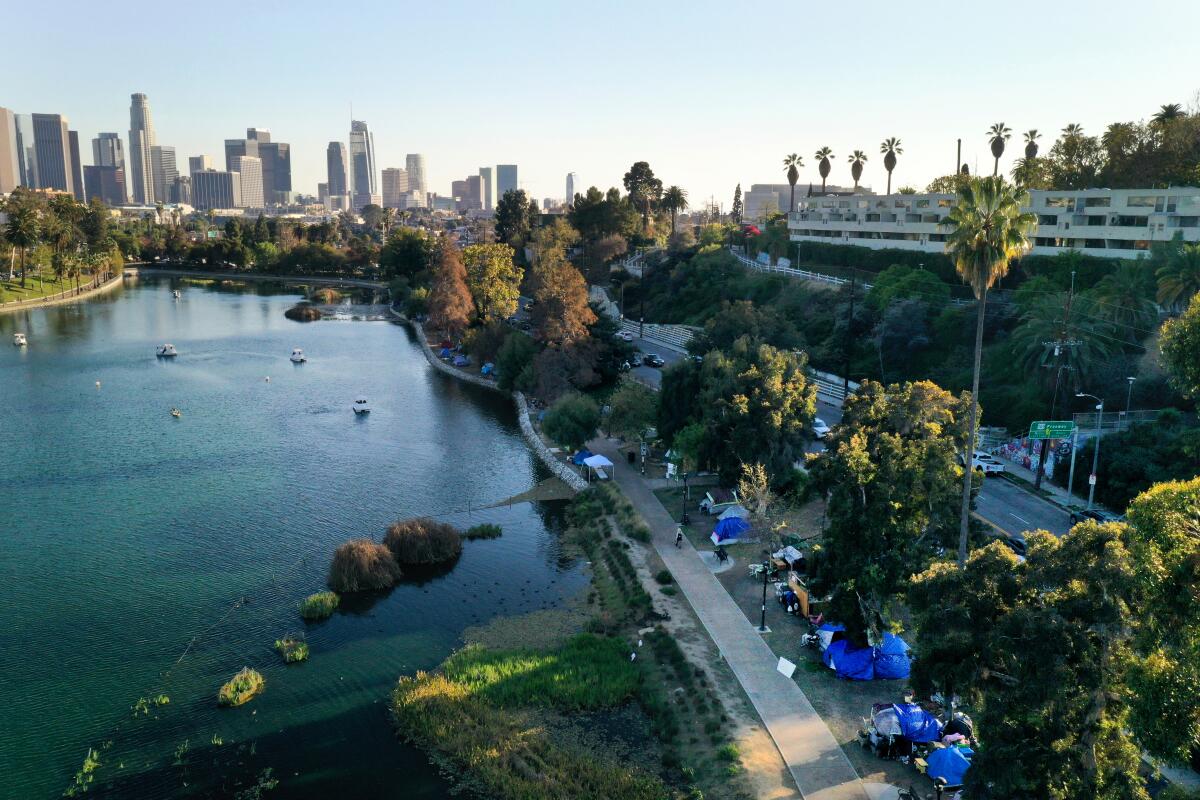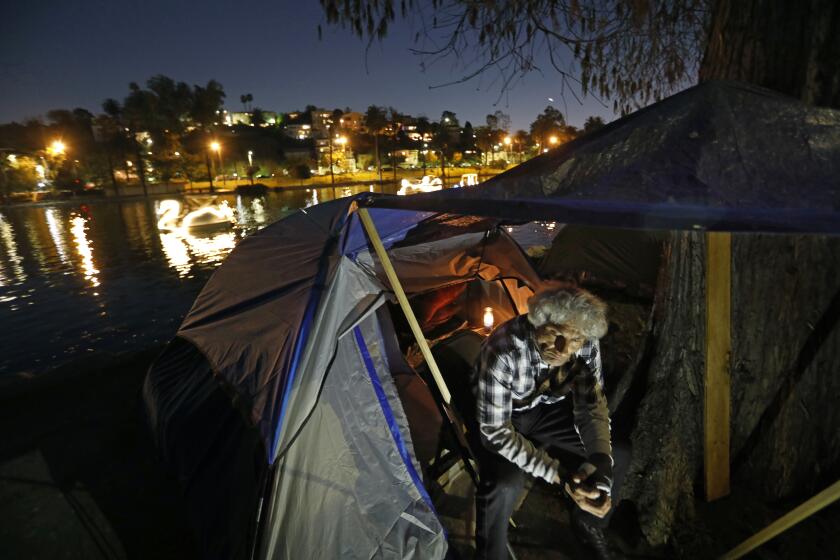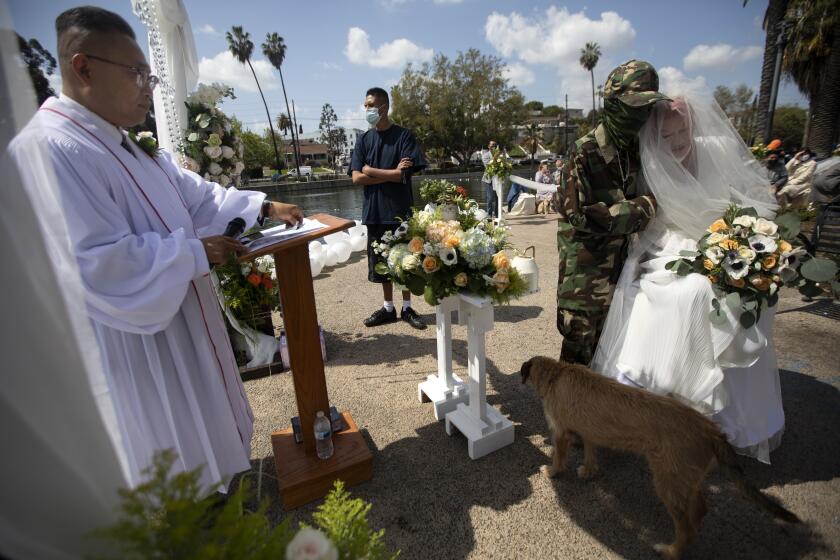City plans to close Echo Park Lake and clear homeless encampment

- Share via
Under a veil of secrecy, Los Angeles city officials and homeless services providers are rushing to move as many homeless people as possible from Echo Park Lake this week in advance of an expected sweep to remove more than 100 tents and fence the entire park for repairs.
City Councilman Mitch O’Farrell, who has said he planned to close the park, has declined to confirm the timetable, but a source with direct knowledge of the process told The Times that the city plans to clear the encampment Thursday, fence the park and close it for renovations.
O’Farrell spokesman Tony Arranaga declined to confirm that date, saying only that the city has been working to move people from the area into hotels.
A homeless encampment at Echo Park Lake has become a symbolically fraught case study of the rights to public spaces
“When official notices of the closure are posted by the Department of Recreation and Parks, our office will alert the public and the media,” Arranaga said.
Outreach workers have been registering as many people living in the park as possible and taking them to hotels being rented by the city for homeless people.
The source with direct knowledge of the process said that notices of the park’s closure would go up Wednesday. The source spoke on condition of anonymity because plans for the park are being tightly held for fear of inspiring large protests like the ones that occurred last year when a similar cleanup was attempted there.
The plans are subject to change.
Jed Parriott, an organizer with Street Watch LA, a homeless advocacy project, said members of his organization had heard from people in city government that the park would be cleared of tents later this week and portions would be fenced off for renovation — so that homeless people couldn’t return.
Parriott declined to say who informed his organization of the news but said the development would be a mistake—particularly as the Centers for Disease Control and Prevention continue to recommend against dispersing encampments for fear of spreading COVID-19.
In recent weeks, outreach workers from homeless service agencies and the Los Angeles Homeless Services Authority have made a concerted effort to use available rooms in hotels for people living by the lake. The Times previously reported that the agency had placed about 46 people in hotel rooms.
A large homeless encampment on the banks of Echo Park Lake has emerged as a divisive flashpoint in Los Angeles’ crisis of how to treat the unhoused. Now the city is believed to be preparing to sweep the camp and close the surrounding park.
A spokesman for the Homeless Services Authority, along with a spokeswoman for the Department of Public Works, which oversees the sanitation bureau, referred questions about the prospective cleanup to O’Farrell’s office. A spokesman for Mayor Eric Garcetti didn’t respond to a request for comment.
Rose Watson, a spokeswoman from the Recreation and Parks Department, declined to say when the park would be closing. However, she said, “having the entire park closed temporarily will allow for repairs to be done as quickly as possible so we can reopen the park to the public for recreational enjoyment.”
A recent city report about the work stated that “construction of the proposed project is anticipated to begin in March 2021.”
They met on a cold night, both taking refuge in the waiting room at Union Station, then upgraded to a tent in the homeless camp on the banks of Echo Park Lake.
Over the last year, the encampment has evolved into a commune-like society with a shared pantry, a garden, a veneer of self-policing and a tenuous grasp on basic sanitation. It has divided the Echo Park community and became a case study of the conflicts arising in neighborhoods across Los Angeles over the rights to public spaces and the competing interests of the housed and unhoused.
In recent years, the city, working with homeless services agencies, has successfully worked to move people living in large encampments near freeways and by Los Angeles International Airport into housing. Those efforts came with more notice and involved extensive outreach in advance to help secure places for people to stay. Homeless services providers expressed concern about the speed with which this is being done.
A decade ago, during the Occupy protests, hundreds of Los Angeles Police Department officers in riot gear swarmed out of Los Angeles City Hall to arrest and clear an encampment in the surrounding park that had sprouted up as a part of a nationwide protest. That show of force by local authorities successfully led to a clearance of the park, which was fenced off and relandscaped. It reopened about six months later.
In an interview this month, O’Farrell, who has been on the receiving end of ample criticism for his handling of the Echo Park encampment, said there has been roughly $600,000 in damage to the park, which would require it to be closed for repairs.
“There’s no permanent damage,” O’Farrell said in early March. “Once we close the entire park for repairs, we will reopen it after the time necessary to make those repairs for full safe access to all park visitors.”
Parriott, who has been intimately involved in organizing and supporting the residents of the encampment, said he didn’t believe that moving people into hotel rooms was ideal for everyone. Some homeless people have chafed at the strict rules put in place at the hotels, which reminded them of being incarcerated. They felt more comfortable camping in the park.
Plans to clear the encampment were moving forward too quickly for many people living in the park, who say it is a safer place to stay than most encampments in the city, Parriott said. In recent months, LAPD officers and park rangers have periodically warned people living by the lake that the tents would be cleared imminently. But they didn’t say when exactly officers would start enforcing bans on sleeping in the park.
“If there are folks who don’t want to go into the system of housing that currently is being offered to them and that is very restrictive, I’m of the mind that they should have a right to public land,” Parriott said. “Public land for public good is a phrase I like to say.”
Last week, an outreach worker found Carlos Pompa, 45, by his tent at the lake and helped him and his girlfriend get into a hotel. They were told to be ready at 8 a.m. Tuesday for a bus to drive them to a hotel. For the stuff they couldn’t carry, a storage bin at a facility downtown would be made available.
Earlier in the pandemic, Pompa spent several months in a hotel but didn’t like the experience. He has been at the park for six months and said it’s been the best place he has stayed in his nearly five years of being homeless — safer and with better access to food and bathrooms. Still, he said he would leave if it meant having a room of his own.
“Being out here in the park has been like the safest, calmest place I’ve been since being on the streets,” Pompa said. “Everybody is pretty much appreciative of it because we’ve all been in worse places. I don’t want everybody kicked out. We’re lucky. But what about people that don’t get to go to a hotel?”
Times staff writer Doug Smith contributed to this report.
More to Read
Sign up for Essential California
The most important California stories and recommendations in your inbox every morning.
You may occasionally receive promotional content from the Los Angeles Times.










